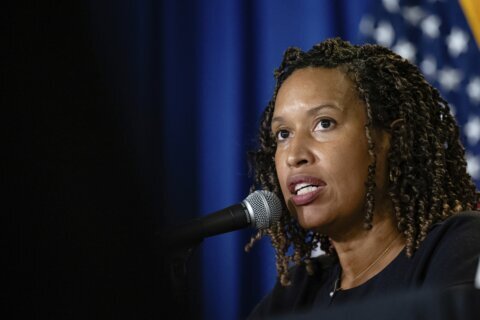D.C. Council members Janeese Lewis George of Ward 4 and Brianne Nadeau of Ward 1 introduced a bill Monday that would allocate government funding to the District’s local news outlets, based on input from residents — a program that, if passed, would be the first of its kind in the country.
The Local News Funding Act would set aside 0.1% of D.C.’s annual budget (about $11.5 million, based on the current budget, according to the bill) to the development of a Local News Grant Program, which would go toward media outlets that report local news.
Every registered voter in D.C. would receive “news coupons” to devote to their preferred outlets and the number of coupons each outlet receives would determine its share of the grant money.
In a news release from her office, Lewis George called strong journalism “indispensable for a healthy democracy and an accountable government,” but said issues like declining revenue, layoffs and discontinuations have limited outlets’ capabilities.
“This bill would create a stable funding source for local reporting so it can continue to inform residents, uncover corruption and abuse, highlight injustices and inequalities, and hold our government accountable to its people,” she said.
In order to be eligible for government funds, a news organization must:
- Report news as its primary activity
- Make local news available for free
- Distinguish local news from advertising
- Disclose their owners, as well as whether they are for-profit or nonprofit, to the public
Eligible news outlets may not be owned or run by D.C. government employees.
The program would be open, however, to a variety of outlets providing “original fact-based information focused on local events,” according to the news release.
This might include local sections of national newspapers, local news websites, local outlets that serve Spanish-speaking or other non-English-speaking residents, blogs focused on specific neighborhoods, independent journalists, radio stations or podcasts and social media-based breaking news sources.
Lewis George said in the news release that this program is a means of promoting public safety.
“Local news has uncovered and kept the spotlight on issues with DC’s crime lab, our 911 call center, the decline in USAO prosecutions, and many other public safety failures,” she said. “The same applies to education, housing, and every major issue in our city. Local journalism drives change, and we need to sustain it.”
A new, seven-member Community Journalism Board would be established to oversee the program, according to the news release. Each board member would be appointed by a different D.C. official — including the mayor (with Council approval), the Board of Elections, the Board of Library Trustees, the Commission on Arts and Humanities, the D.C. Attorney General, the State Board of Education and HumanitiesDC.
The bill would not include television news outlets, since D.C. already has a grant program that develops TV content for public, educational and government channels. Additionally, the program would include “narrow exclusions” for marketing publications and sports reporting, according to the news release.
“This bill is meant to kick off a debate about the need for a program like this and how to
structure it,” Lewis George said in the news release. “But we can’t deny that the old journalism model is starting to fall apart, and doing nothing will only continue the decline. Local news is worth fighting for.”








